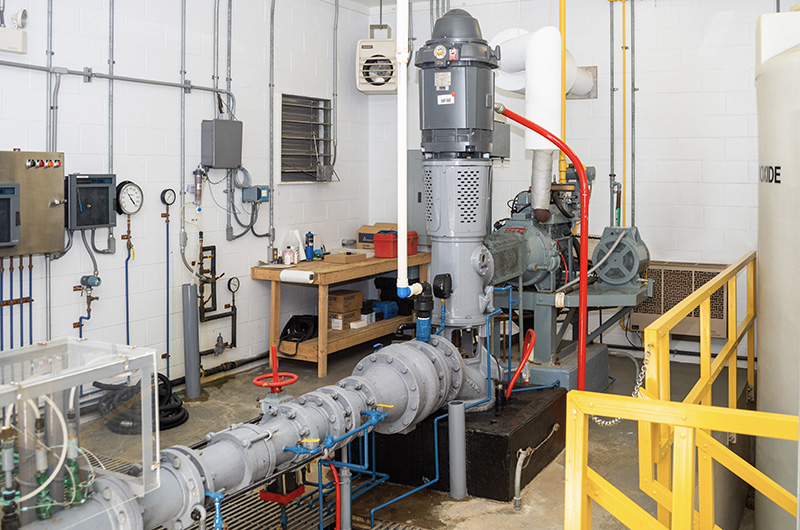Bill Chapman, Edgartown water supervisor, is always sprinting to stay ahead of the pipes.
“I never got a phone call from a water main telling me that it’s going to break,” said Mr. Chapman, a man with a tight haircut and a pen in his shirt pocket.
“There’s a lot of preparedness that comes into operating in a remote setting,” he added.
The stakes are high. In summer months the department pumps an average of 1,918,375 gallons a day to supply water to Edgartown residents. In the off-season, that number drops to 523,000 gallons a day. Over the entirety of 2021, the department pumped more than 335 million gallons, Mr. Chapman said.
Mr. Chapman began his aqueous career 27 years ago, with a job checking water meters in his hometown of Belchertown. He became Edgartown supervisor in 2014.
Working his way up the ranks, he said, was the best way to become the jack-of-all-tradesman that a water supervisor needs to be.
“You gotta have carpentry skills, plumbing skills, electrical skills, computer skills, landscaping skills, excavation skills — all these things come into it,” he said.
Over the years, municipal water has become a lot more complex, he added.
“Just understanding the names of these contaminants has gotten harder…I mean nitrate, that’s easy, but now they have words about this long,” he said, holding his hands about a foot apart. “And you have to use acronyms because there’s only about 10 people on the face of the planet who can pronounce them.”
PFAS (per and polyfluoroalkyl substances) is one example, he said, of a long word you don’t want in your water.
In the water department stockyard is a repository for spare parts an Island might need in a water emergency, including extra hydrants, bright red, each screwed onto a 12-foot water-pipe. Hydrants, Mr. Chapman said, are a bit like icebergs, which in turn are a bit like water departments.
“There is a lot going on below the surface,” Mr. Chapman said.
But there is one acronym that makes his life easier, he added. The Supervisory Control and Data Acquisition or SCADA system is the department’s electronic brain, coordinating all the wells in the Edgartown system under the watchful eyes of assistant supervisor Shane Ben David.
The SCADA, Mr. Ben David said, directs the wells to pump into the Katama water tower, which pressurizes all pipes, faucets and shower heads. Once the tower reaches a certain level, the wells are told to stop. The SCADA is so important to the operation that the department has a backup mounted on the wall of the main office. They also have a building generator, so it can run in a blackout.
The department, in fact, has backups of just about everything: throttles, pipes, equipment, machinery. They also keep two backup engines for each of their wells, one electric and one propane.
All these redundancies, Mr. Chapman said, help them stay on track with a relentlessly unpredictable job.
“In the morning you can plan to do A, B and C, and at the end of the day, you did part of A, you never touched B or C, but D, E and F took the front burner,” he said. “Sometimes I get a bit tired of the excitement.”
After fixing the problems that pop up over the course of the day, the department tries to head off future problems, making sure they don’t “have to catch the horse after it’s gone out the gate,” Mr. Chapman said.
One major element of that effort is water testing, done both with MassDEP and on a voluntary basis. In 2019, Edgartown water was measured as among the state’s cleanest. But that level of purity, Mr. Chapman worried, might be at risk.
“Septic’s gonna be the death of this Island,” he said “I think a bunch of warning signs have been missed. Septic trucks are already hauling off-Island and nobody is up-in-arms about it.”
He believes that the Island should instead focus on constructing a regional septic treatment facility that ultimately results in an ocean outflow.
“Naturally, the design would include considerable redundancy,” he said.
Despite all the stresses Mr. Chapman’s passion shines through when talking about the job, including the benefits of potassium hydroxide versus sodium hydroxide purification treatment, or throttling well output for energy usage.
“Some days you wonder why you still do it,” he said. “But this is a really passionate group of individuals. You’ll get out of this job everything that you put into it.”






Comments (9)
Comments
Comment policy »